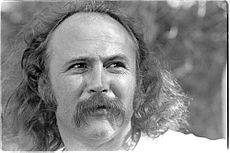Gregory Stuart Lake (10 November 1947 – 7 December 2016) was an English singer, songwriter, bassist, guitarist and record producer. He gained prominence as a founding member of the progressive rock bands King Crimson and Emerson, Lake & Palmer (ELP).
Born and raised in Dorset, Lake began to play the guitar at the age of 12 and wrote his first song, "Lucky Man", at the same age. He became a full-time musician at 17, playing in several rock bands until fellow Dorset guitarist Robert Fripp invited him to join King Crimson as their singer and bassist. They found commercial success with their influential debut album, In the Court of the Crimson King (1969). Lake left the band in 1970 and achieved significant success in the 1970s and beyond as the singer, guitarist, bassist, and producer of ELP. As a member of ELP, Lake wrote and recorded several popular songs including "Lucky Man" and "From the Beginning". Both songs entered the UK and US singles charts.
Lake launched a solo career, beginning with his 1975 single "I Believe in Father Christmas" which reached number two in the UK. He went on to release two solo albums thereafter, as well as collaborating with other artists. Lake performed with various groups in the 1980s, and occasional ELP reunions in the 1990s, and toured regularly as a solo artist into the 21st century. He died on 7 December 2016 in London, of cancer, at the age of 69.
Early life
Greg Lake was born on 10 November 1947 in the Parkstone area of Poole in Dorset, to Harry, an engineer, and Pearl, a housewife. He grew up in the residential suburb of Oakdale. Speaking about his childhood, Lake said he was "born in an asbestos prefab housing unit" into a "very poor" family, and remembered several cold winters at home, but credits his parents for sending him money and food during his time as a struggling musician. He later described his upbringing as a happy one.









